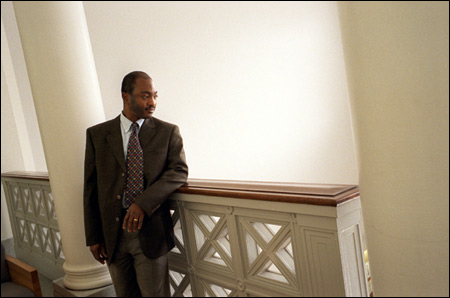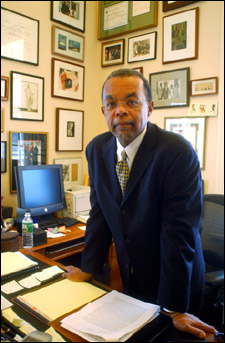New African studies concentration named:
Beginning in academic year 2004-05, undergrads will be able to choose an African Studies track

Beginning in the academic year 2004-05, undergraduates will be able to choose an African Studies track within an expanded Afro-American Studies Department, renamed the Department of African and African American Studies. The new concentration will supercede the existing Certificate in African Studies.
The reorganized department also plans to create an African Language Program to supplement this new track, and is completing a search for a senior preceptor who will launch this program as early as the next academic year.
According to Henry Louis Gates Jr., the W.E.B. Du Bois Professor of the Humanities and chair of the newly renamed department, the change coincides with a growing interest in Africa on the part of undergraduates, reflected in a steady increase in enrollment in Africa-related courses and in the number of senior theses on African topics.
“An undergraduate track in African studies will nurture and provide a stable programmatic base for this interest and will transform Harvard into a university that attracts students with an African interest,” said Gates.

According to Emmanuel Akyeampong, professor of history and chair of the Committee on African Studies, the new African Language Program will supplement the teaching of Swahili (currently taught in the Department of Near Eastern Languages and Civilizations) with courses in Hausa, the lingua franca for many of the countries of West Africa, plus one of the major languages of Southern Africa, possibly Zulu.
The reorganization of the department will also place a new focus on the African diaspora, a movement of peoples and cultures of worldwide significance, which continues to this day.
“For the past 10 years, there’s been a strong interest in looking at the African diaspora, not just the old dispersion resulting from the slave trade, but the contemporary diaspora as well, which includes people like myself – I came [from Ghana] in 1987. The repositioning of this department will enable Harvard to take the lead in how we study the diaspora today.”
The Committee on African Studies will continue to exist following the reorganization, but its function will be to organize the study of Africa beyond FAS (Faculty of Arts and Sciences). It will focus its energies on facilitating collaboration among faculty and students working on African topics across the University. Currently, Africa-related courses are offered by the Schools of Business, Divinity, Education, Government, Law, Medicine, Public Health, and Continuing Education.




